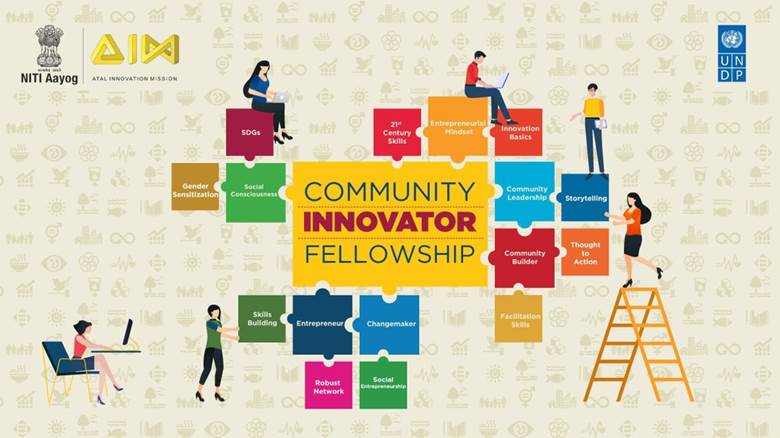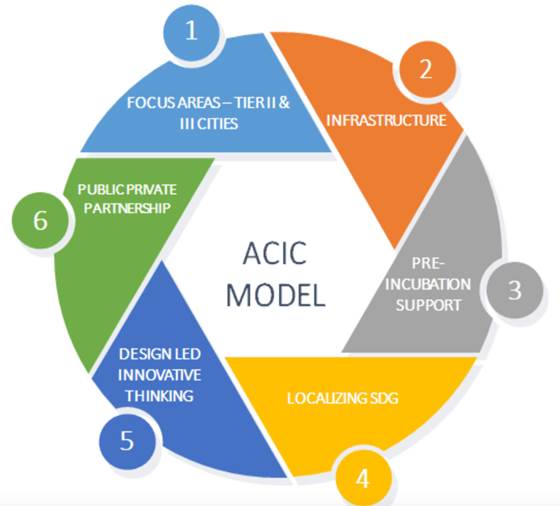Description

Copyright infringement not intended
About
- Recently, Atal Innovation Mission (AIM), NITI Aayog has announced the applications for the Community Innovator Fellowship (CIF).
- The initiative aims at encouraging knowledge building and providing infrastructure support to aspiring community innovators.
- A Community Innovator Fellow is an individual with an entrepreneurial mindset, with an idea to solve a community challenge through enterprise.
- This is a one-year-long intensive fellowship program wherein aspiring community innovators can apply irrespective of their socio-economic background.
- Currently, 22 Community Innovator fellows are being incubated at the Atal Community Innovation Centre (ACIC) program.
- AIM has been setting up Atal Community Innovation Centers across the country.
Atal Community Innovation Centers (ACIC)
- They are established to serve the unserved/underserved areas of the country concerning the start-up and innovation ecosystem.
- ACIC aims to:
- Provide equitable opportunities, especially by reducing the lab-to-land distance and creating a space for the pre-incubation of ideas/solutions to reach the innovators at the bottom of the pyramid through Public Private Partnerships (PPP) model.
- Enable local communities to convert or upgrade their ideas into products and services, by blending creativity, science and technology, design and risk-seeking approaches that constitute the heart of grassroots innovation.
- ACIC Model
- The focus is on the Unserved and Underserved regions in India in terms of idea generation, promotion of innovations and innovators at the grassroots level.
- The physical space of the ACIC provides a gateway for experimentation, engagement and participation.
- Financial assistance of 2.5 crores is provided to the ACIC for running space, innovation and outreach operations.
- Aspiring entrepreneurs in the pre-incubation process will be provided directional training and mentoring by a business or research expert in making their ideas viable
- ACIC will nurture Sustainable Development Goals (SDGs) innovations and entrepreneurial ventures.
- The aspiring innovators in the community will be educated about the SDGs and innovations and entrepreneurial ventures catering to SDG transformations.
- Knowledge of design methods and their integration into industry and government can help people articulate latent needs and find local solutions to these needs.
- Diversifying finances and networking can build a competitive and more productive ecosystem of development and progress

.jpg)
Atal Innovation Mission (AIM)
- The Atal Innovation Mission was initiated by the NITI Aayog in 2016 to promote innovation and entrepreneurship across the country.
- The main objective of the mission is to create and promote an ecosystem of innovation and entrepreneurship at schools, universities, Research institutions, MSMEs and Industry levels.
- Under the Mission, Atal Tinkering Labs are established to promote a creative, innovative mindset in schools.
- At the school level, AIM is setting up state-of-the-art Atal Tinkering Labs (ATL) across all districts across the country.
- These ATLs are dedicated innovation workspaces on the latest technologies like 3D Printers, Robotics, the Internet of Things (IoT), etc.
- Atal Innovation Tinkering challenges are regularly held in the school as well as by AIM every month to ensure students' active involvement in creating innovative solutions to solve problems in their community and the country.
- Atal Incubators to Promote entrepreneurship in universities and industry.
- Atal Community Innovation Centers to promote the benefits of technology to the underserved regions of India including Tier 2, Tier 3 cities, Aspirational districts, and tribal, hilly and coastal areas.
- Mentor of Change: To encourage a vibrant ecosystem of innovation, AIM is promoting active collaboration between Government, Academia, Industry, Individuals and Societal focused NGOs.
NITI Aayog
- The creation of the Planning Commission was inspired by the USSR/Soviet Model, the Prime Minister established a Planning Commission in 1950 to design the five-year Plans for India.
- In 2015, it was replaced by a new organization named National Institution for Transforming India (NITI).
- Promote Cooperative Federalism
- The Governing Council of NITI Aayog has Lieutenant Governors of Union Territories and State Chief Ministers.
- NITI Aayog Constituted a Committee of State Chief Ministers to examine important issues.
- Promote Competitive Federalism
- NITI Aayog has Prepared online dashboards to rank the States on various indicators of development Such as;
- Sustainable Development Goals (SDG) India Index.
- Health Index.
- School Education Quality Index.
- Digital Transformation Index.
- Launched Aspirational District Programs for monitoring the progress of backward districts.
- NITI Aayog has not been given the mandate or Powers to impose Policies on States.
- NITI Aayog is a think tank or an advisory body.
- The Powers for the allocation of funds has not been given to the NITI Aayog. The Powers are with the Finance Ministry.
- As a ‘think-tank’, Niti Aayog has helped the government In framing various Policies on;
- Clean energy
- Methanol based economy
- Infrastructure, human development etc.
- The model acts on agricultural land leasing, livestock Selling etc.
- NITI Aayog regularly organizes Seminars, Workshops, and Conferences.
- NITI initiated Atal Innovation Mission (AIM) to help Startups. NITI is developing the National Program on Artificial Intelligence.
- NITI’s approach is modernized, forward-looking, and less bureaucratic; NITI Aayog is playing an important role as a think tank for Economic growth, Human development and Good governance in India.
.jpg)
Government Schemes to Support Startups in India
- SAMRIDH (Startup Accelerators of MeitY for Product Innovation, Development, and growth) Scheme to provide funding support to startups along with helping them bring skill sets together which will help them grow successfully.
- Startup India Seed Fund - The Startup India Seed Fund Scheme (SISFS) aims to provide financial assistance to startups for proof of concept, prototype development, product trials, market entry and commercialization.
- Startup India Initiative gives tax benefits to startups under this scheme.
- A Scheme for Promotion of Innovation, Rural Industries and Entrepreneurship (ASPIRE) initiative to offer proper knowledge to entrepreneurs to start their businesses and emerge as employers.
- Pradhan Mantri Mudra Yojana (PMMY) provide startup loans of up to INR 10 lakhs to small enterprises and non-corporate business and non-farm small/micro-enterprises.
- eBiz - the first electronic government-to-business(G2B) portal, to transform and develop a conducive business environment in the country.
- “Support for International Patent Protection in E&IT (SIP-EIT)”. This scheme provides financial support to MSMEs and Technology Startups for international patent filing.
- Multiplier Grants Scheme (MGS): This scheme aims to encourage collaborative Research & Development (R&D) between industry and academics/institutions for the development of products and packages. Under the scheme, if the industry supports the R&D of products that can be commercialized at the institutional level, the government shall provide financial support which will be up to twice the amount provided by the industry.
- Venture Capital Assistance (VCA) scheme by Small Farmer’s Agri-Business Consortium (SFAC) for the welfare of farmer-entrepreneurs. It intends to assist in the form of term loans to farmers so that the latter can meet the capital requirements for their project's implementation.
- Start-ups' Intellectual Property Protection (SIPP) scheme was launched to encourage innovation and creativity in startups. Under this scheme, an 80% rebate for patent filing fees and 50% for trademark filing is provided to startups.
https://newsonair.gov.in/News?title=Atal-Innovation-Mission-launches-applications-for-Community-Innovator-Fellowship&id=451655
https://t.me/+hJqMV1O0se03Njk9







.jpg)










